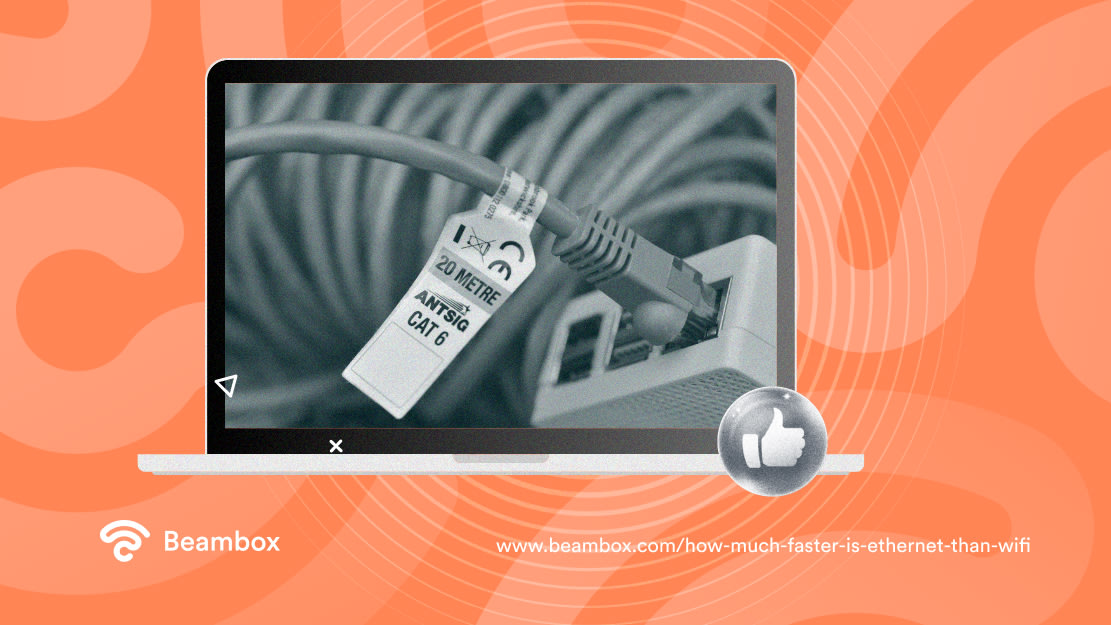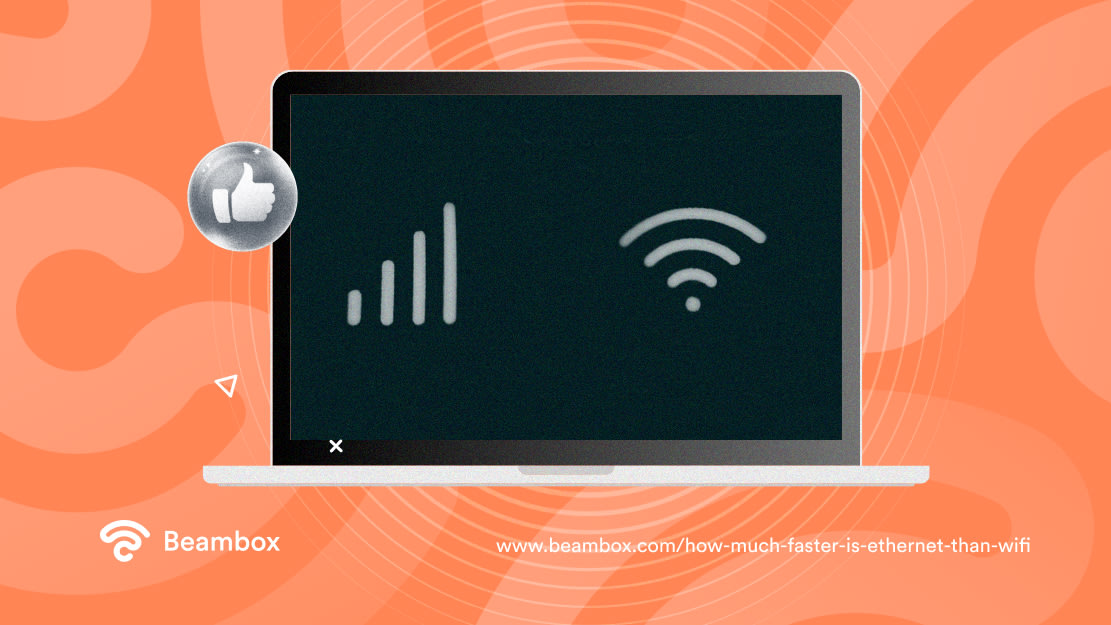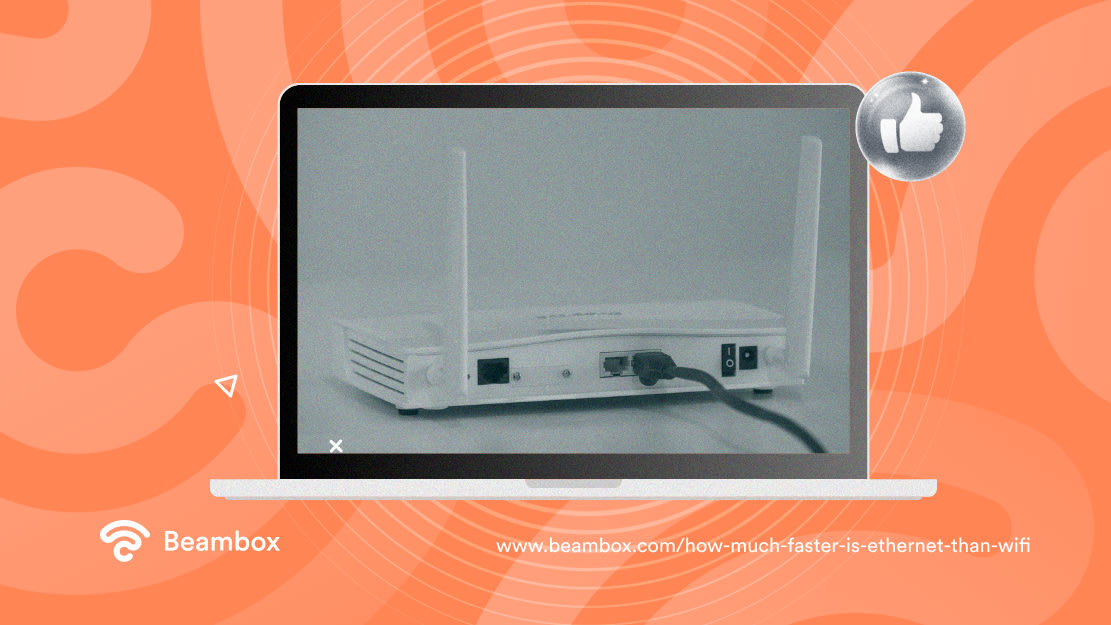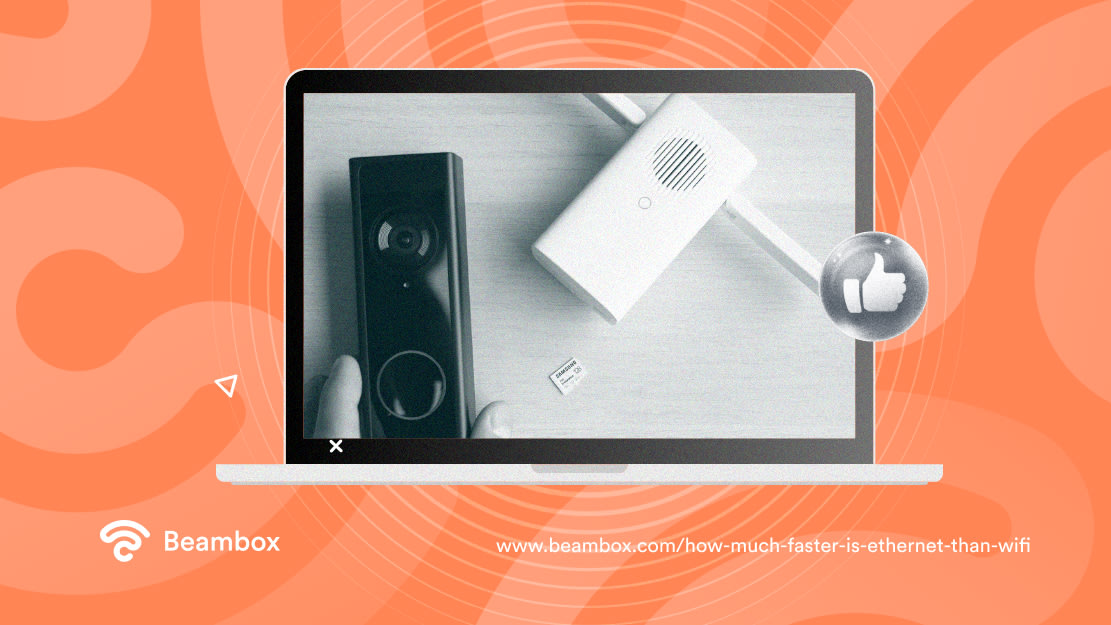With freelancing and online businesses picking pace, the thought of going a single day without the internet is scary. Even if a business doesn’t run entirely on this model, it needs an online presence. Therefore, how much faster is Ethernet than WiFi is a valid question.
When did WiFi become popular? It started gaining widespread use in the early 2000s as more homes and businesses adopted the technology for internet connectivity.
A fast and reliable connection is necessary to avoid bearing losses. Not only that, our normal life operations also depend on the internet. Studies, entertainment, shopping, you name it.
To extend WiFi coverage in your home, you can use or extend WiFi Ethernet cable to connect a WiFi extender to your router. So, if you’re wondering whether Ethernet is best for you or WiFi, use this article as a guide. It will answer “How much faster is Ethernet than WiFi?” and help you choose the one that suits your needs.

What Is the Difference Between the Working of Ethernet and WiFi?
Satellite Internet vs WiFi: Satellite Internet offers broader coverage, while WiFi provides faster, localized connections within a specific area. The first step to learning “how much faster is Ethernet than WiFi” is understanding the working of both. Let’s start with Ethernet.
It uses a wired connection to link computers and networks to help them communicate. When you use an Ethernet cable to connect to the internet, you create a LAN, WAN, or other type of network.
To improve your internet connection in every corner of your home, you can extend WiFi over Ethernet.
The difference between Wide Area Networks (WANs) and Local Area Networks (LANs) lies in their geographical coverage and the number of connected devices.
Wan vs Lan: WAN (Wide Area Network) connects devices over a large geographical area, while LAN (Local Area Network) links devices within a confined space like a home or office.
These cables have either a fiber or coaxial coating with twisted wires inside. Moreover, a set of rules or Ethernet protocols are necessary for the network to be successful.
Now, moving on to WiFi, it essentially does the same thing as a wired network: connecting computers. But that’s where the similarities end because it stands for Wireless Fidelity. Therefore, it doesn’t need to rely on wires to connect computers, and the working is completely different.
WiFi technology uses radio waves to send and receive data from the router to the connected devices. But if there are no wires, something else must encourage the back and forth of data.
If that’s going through your mind, you’re heading in the right direction. Because WiFi uses frequencies of 2.4 GHz and 5 GHz instead of wires. When you want to access something online, your device converts the request into a sequence of 0’s and 1’s.
This binary code turns into radio frequencies and then back into a code at the router to fetch your request.
Factors That Matter: Why Is Ethernet Faster Than WiFi?
With Ethernet, only a single device can connect per port. Therefore, there is no doubt that Ethernet is faster than WiFi. But to truly understand “how much faster is Ethernet than WiFi” and choose suitably, you must explore the factors.
- Physical Medium: The first reason is the difference in medium. As established, Ethernet connections use physical wires. This gives a steady and reliable route for the data, keeping potential interference at bay.
- Interference: A WiFi connection can get cranky when other gadgets, nearby networks, walls, etc. interfere with the signal. This means you won’t get the speeds you want to load things in the blink of an eye. You can solve this problem with WiFi extenders.
- Shared bandwidth: Multiple devices share WiFi’s frequency spectrum. So traffic jams and slower speeds are inevitable.
- Security protocols: Without wires, WiFi relies on protocols for security, which can play with the speed. In contrast, Ethernet cables are already secure enough to keep hackers and meddling hands away.

Let’s Talk Numbers: How Much Faster Is Ethernet Than WiFi?
Now that we know the reasons why Ethernet is faster than WiFi let’s jump to the numbers. But before stating how much faster is an Ethernet cable than WiFi, let’s make one thing clear. The specific speed difference will depend on the type of Ethernet cables you’re using.
Let’s suppose your friend has the Cat 6 Ethernet cable while you have the Cat 7. The maximum speed of Cat 6 is 1000 Mbps with 250 MHz frequency.
On the other hand, Cat 7 gives a speed of 10,000 Mbit per second with a 1000 MHz frequency. These statements leave no doubt that your Ethernet cable will be much faster than your friend’s.
With that said, let’s compare the speed to wireless to understand how much faster is Ethernet than WiFi. Ethernet cables can give you a consistent speed of up to 10 Gbps. On the contrary, the latest WiFi 6E gives 5 to 8 Gbps. Hence, it’s crystal clear that Ethernet is faster than WiFi.
How Much Faster Is Ethernet Than WiFi: The Pros and Cons of Each
Speed isn’t the only thing that matters in the heated debate between WiFi and Ethernet. You wouldn’t want to risk your data at the expense of having fast speeds. Therefore, you must also understand the pros and cons of each.
Firstly, WiFi lets you move freely around the house or office. With Ethernet cables, you must sit in one place to use the device.
Secondly, we’ve talked a lot about the speed of both connections when answering, “How much faster is Ethernet than WiFi.” So let’s just say Ethernet is better than WiFi in this regard and call it a day.
However, if you’re after aesthetics and want to avoid tripping on wires, Ethernet is not the answer.
Moreover, Ethernet has much lower latency than WiFi. This statement is probably making you wonder what latency is. Well, let’s understand with an example.
Suppose you’re sending a message to one of your employee’s WhatsApp. Now latency is the time it takes for that message to leave your phone and reach your employee’s device. Remember, this time also includes converting the message from binary codes to human language.
In simpler terms, there is more time delay when you send a request through WiFi as compared to Ethernet.
Furthermore, you’re more likely to find dead zones around the building where WiFi signals don’t quite reach. Even the best router will face this problem occasionally, so the solution here is Ethernet.
And lastly, your data is much more secure when traveling through Ethernet since there is a physical connection. On the other hand, it’s easier for hackers to gain access to radio waves in the air.
How Much Faster Is Ethernet Than WiFi: Choose the One That Suits You
There’s no point in discussing “how much faster is Ethernet than WiFi” if it can’t help you choose between them. By now, it must be clear that different needs call for different choices.
But how do you make that choice? What factors come into play that make WiFi best in some situations while Ethernet best in others?
The following sections will answer these questions and clear any doubts you might have. Let’s dive into the details.

How Much Faster Is Ethernet Than WiFi? When To Choose Ethernet
While setting up an Ethernet network may not be the most aesthetic, there are times when you must sacrifice looks. So, let’s discuss the situations where you should choose Ethernet.
Firstly, let’s consider speed since this article is about “how much faster is Ethernet than WiFi.” Streaming HD videos, gaming, and video calls require higher speeds. You don’t want to lose an online game just because your internet is slow, do you?
Therefore, opt for Ethernet in such situations. Secondly, sharing large files requires a lower latency, which Ethernet can provide. Remember, the higher latency of WiFi can sometimes cause incomplete transfers at slower speeds, forcing you to repeat the process.
Thirdly, choose Ethernet if there are several devices backing up to a hard drive or backup server. Again, speed and signal strength come into play here, as you can’t carry such heavy backups through WiFi.
Lastly, if you’re always using your device in the same spot, you won’t have to worry about connections. So why not take advantage of Ethernet’s speed?
How Much Faster Is Ethernet Than WiFi? When To Choose WiFi
While knowing how much faster is Ethernet than WiFi may tempt you to stick with Ethernet, it’s not always ideal. After all, WiFi came into being for a reason. So here’s when you should go wireless.
If you prefer moving while using the internet, choose WiFi. You wouldn’t want to plug and unplug Ethernet cables wherever you go.
Moreover, if your building is full of wireless devices, there’s no need to go over the hustle of messy wires.
WiFi gives you an internet signal all over the building, no matter where you are, even in the garden! Here’s the twist, though. Your router must be strong enough to send signals to places far from it. But don’t expect signals to reach across the street, as that’s not how it works.
Also, IoT devices like smart TVs, smart watches, etc. require WiFi. You can’t possibly connect your phone to your watch with an Ethernet cable!
Lastly, if your home or office is on rent, your landlord might not let you run Ethernet cables. In this case, opt for WiFi.
How To Choose the Ethernet Cable and WiFi Router That Suits Your Needs?
All Ethernet cables and WiFi routers aren’t equal, nor are your needs the same as others. Therefore, you must get information on choosing the best cable and router. To take our discussion about “how much faster is Ethernet than WiFi” further, let’s help you choose.
For Ethernet, speed is the first thing that can give you an indication of the best cable. You don’t want to go through the process of cable setup to find out it doesn’t fit your internet speed.
Here’s an example. If you’ve purchased a plan supporting 10 Gbps, the older Cat 5 cable will limit you and waste your money. Cat 6A cable would be the best for this.
Moreover, in areas with higher interferences, like universities with thousands of connected devices, opt for shielded over unshielded.
The reason is that shielded cables are more rigid and can survive a lot of wear and tear.
Alternatively, unshielded cables would be more suitable for homes and small businesses. Choosing an Ethernet cable also depends on your budget. If you’re ready to invest more money, use a pure copper cable with a gold-plated connector. This will give you longevity, latency, and the best speeds.
When choosing a WiFi router, two things are common with Ethernet. You must choose a router that supports your internet speed.
A router supporting higher speeds will lead to money wastage, while one supporting lower ones will be of no use. The other common factor is budget. The router you choose must fit your budget and cater to your needs. Moreover, make sure your ISP supports the router you choose.
Choosing old protocols won’t do you any good. So choose the one with newer protocols and optional features to make your investment futureproof.

How Much Faster Is Ethernet Than WiFi: Enhance Wireless Signals With This Device
After learning “how much faster is Ethernet than WiFi, “do you still want to go wireless?” Or maybe you’re constantly moving and want to avoid dead zones. Well, WiFi boosters or extenders can help!
A WiFi extender is a cable or device that makes your WiFi signal reach further. It essentially creates a second network to help you cover dead zones.
Alternatively, a WiFi booster would be a good idea if you want to avoid cables completely. It is a device that takes the existing WiFi signal and rebroadcasts it. However, don’t expect it to reach too far away since it also relies on radio waves.
Another solution is repeaters. These devices improve the speed and performance of the WiFi signal in a particular area. Therefore, they aren’t good for dead zones.
How Much Faster Is Ethernet Than WiFi: Will WiFi Ever Beat Ethernet?
At this point, you must have gotten the answer to “How much faster is Ethernet than WiFi.” To recap, while it depends on your router and cable type, Ethernet almost always gives better speeds than WiFi.
It is thanks to the ability of Ethernet wires to transfer more data, have lower latency, and unshared max bandwidth.
However, since WiFi technology is constantly evolving, there’s a chance that WiFi 7 will replace Ethernet cables. But that’s a question only time can answer.
If you have a local business and want to scale your marketing operations and results, check out Beambox. It’s a WiFi marketing platform that lets you grow your online reputation and automate your marketing campaigns. Moreover, you can use Beambox to learn more about your customers and secure your WiFi connection.
Twelve thousand venues are using Beambox to grow their profits. Do you want to be next? Start your free trial today!
Get Started With Free WiFi Marketing
Beambox helps businesses like yours grow with data capture, marketing automation and reputation management.
Sign up for 30 days free